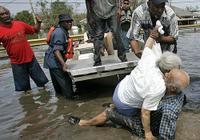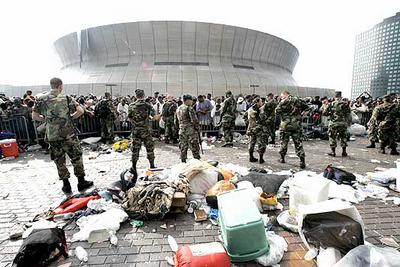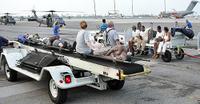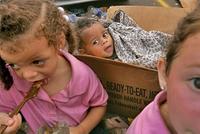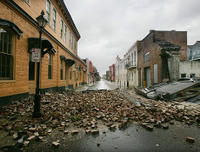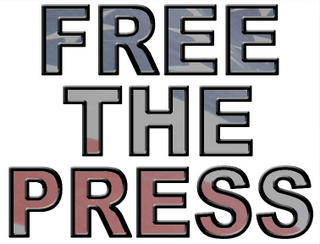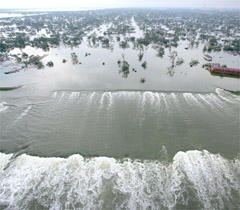Thousands Remain To Be Evacuated
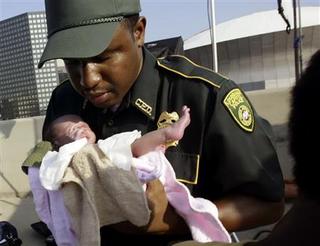
White House Shifts
Blame to Local
Officials
By Manuel Roig-Franzia and Spencer Hsu
Washington Post Staff Writers
Sunday, September 4, 2005; A01
Link Here
NEW ORLEANS, Sept. 3 -- Tens of thousands of people spent a fifth day awaiting evacuation from this ruined city, as Bush administration officials blamed state and local authorities for what leaders at all levels have called a failure of the country's emergency management.
President Bush authorized the dispatch of 7,200 active-duty ground troops to the area -- the first major commitment of regular ground forces in the crisis -- and the Pentagon announced that an additional 10,000 National Guard troops will be sent to Louisiana and Mississippi, raising the total Guard contingent to about 40,000.
Authorities reported progress in restoring order and electricity and repairing levees, as a hospital ship arrived and cruise ships were sent to provide temporary housing for victims. As Louisiana officials expressed confidence that they had begun to get a handle on the crisis, a dozen National Guard troops broke into applause late Saturday as Isaac Kelly, 81, the last person to be evacuated from the Superdome, boarded a school bus.
But there remained an overwhelming display of human misery on the streets of New Orleans, where the last 1,500 people were being evacuated from the Convention Center amid an overpowering odor of human waste and rotting garbage. The evacuees, most of them black and poor, spoke of violence, anarchy and family members who died for lack of food, water and medical care.
About 42,000 people had been evacuated from the city by Saturday afternoon, with roughly the same number remaining, city officials said. Search-and-rescue efforts continued in flooded areas of the city, where an unknown number of people wait in their homes, on rooftops or in makeshift shelters. Hundreds of thousands of people have been displaced by the flooding -- 250,000 have been absorbed by Texas alone, and local radio reported that Baton Rouge will have doubled in population by Monday. Federal officials said they have begun to collect corpses but could not guess the total toll.
Behind the scenes, a power struggle emerged, as federal officials tried to wrest authority from Louisiana Gov. Kathleen Babineaux Blanco (D). Shortly before midnight Friday, the Bush administration sent her a proposed legal memorandum asking her to request a federal takeover of the evacuation of New Orleans, a source within the state's emergency operations center said Saturday.
The administration sought unified control over all local police and state National Guard units reporting to the governor. Louisiana officials rejected the request after talks throughout the night, concerned that such a move would be comparable to a federal declaration of martial law. Some officials in the state suspected a political motive behind the request. "Quite frankly, if they'd been able to pull off taking it away from the locals, they then could have blamed everything on the locals," said the source, who does not have the authority to speak publicly.
A senior administration official said that Bush has clear legal authority to federalize National Guard units to quell civil disturbances under the Insurrection Act and will continue to try to unify the chains of command that are split among the president, the Louisiana governor and the New Orleans mayor.
Louisiana did not reach out to a multi-state mutual aid compact for assistance until Wednesday, three state and federal officials said. As of Saturday, Blanco still had not declared a state of emergency, the senior Bush official said.
"The federal government stands ready to work with state and local officials to secure New Orleans and the state of Louisiana," White House spokesman Dan Bartlett said. "The president will not let any form of bureaucracy get in the way of protecting the citizens of Louisiana."
Blanco made two moves Saturday that protected her independence from the federal government: She created a philanthropic fund for the state's victims and hired James Lee Witt, Federal Emergency Management Agency director in the Clinton administration, to advise her on the relief effort.
Bush, who has been criticized, even by supporters, for the delayed response to the disaster, used his weekly radio address to put responsibility for the failure on lower levels of government. The magnitude of the crisis "has created tremendous problems that have strained state and local capabilities," he said. "The result is that many of our citizens simply are not getting the help they need, especially in New Orleans. And that is unacceptable."
In a Washington briefing, Homeland Security Secretary Michael Chertoff said one reason federal assets were not used more quickly was "because our constitutional system really places the primary authority in each state with the governor."
Chertoff planned to fly overnight to the New Orleans area to take charge of deploying the expanded federal and military assets for several days, he said. He said he has "full confidence" in FEMA Director Michael D. Brown, the DHS undersecretary and federal officer in charge of the Katrina response.
Brown, a frequent target of New Orleans Mayor C. Ray Nagin's wrath, said Saturday that "the mayor can order an evacuation and try to evacuate the city, but if the mayor does not have the resources to get the poor, elderly, the disabled, those who cannot, out, or if he does not even have police capacity to enforce the mandatory evacuation, to make people leave, then you end up with the kind of situation we have right now in New Orleans."
New Orleans City Council President Oliver Thomas acknowledged that the city was surprised by the number of refugees left behind, but he said FEMA should have been prepared to assist.
"Everybody shares the blame here," said Thomas. "But when you talk about the mightiest government in the world, that's a ludicrous and lame excuse. You're FEMA, and you're the big dog. And you weren't prepared either."
In Baton Rouge, Blanco acknowledged Saturday: "We did not have enough resources here to do it all. . . . The magnitude is overwhelming."
State officials had planned to turn to neighboring states for help with troops, transportation and equipment in a major hurricane. But in Katrina's case, Mississippi, Alabama and Florida were also overwhelmed, said Denise Bottcher, a Blanco spokesman.
Bush canceled a visit with Chinese President Hu Jintao that had been scheduled for Wednesday and made plans to return to the Gulf Coast on Monday. Defense Secretary Donald H. Rumsfeld and Secretary of State Condoleezza Rice scheduled visits to the region, as troops continue to pour in.
Top Bush administration officials met at the White House with African American leaders amid criticism that the federal response to Hurricane Katrina has neglected impoverished victims, many of them black.
Chertoff, Housing Secretary Alphonso Jackson, White House domestic policy adviser Claude Allen and Pentagon homeland security official Peter Verga met for two hours with NAACP President Bruce Gordon, National Urban League President Marc H. Morial and Rep. Elijah E. Cummings (D-Md.), the former chairman of the Congressional Black Caucus. The caucus's current chairman, Rep. Melvin Watt (D-N.C.), participated by phone.
"I think they wanted to make sure that the leaders of the Congressional Black Caucus, the Urban League and the NAACP knew that they were very sensitive to trying to make sure that things went right from here on out," Cummings said, according to his spokeswoman, Devika Koppikar. "And I think they wanted to try to dispel any kind of notions that the administration did not care about African American people -- or anyone else."
Caucus Executive Director Paul A. Brathwaite said Bush officials promised to keep black leaders informed. He credited the administration with reaching out to the caucus for the first time to solve a national problem.
In New Orleans on Saturday, smoke from several fires that have burned for days swirled over the French Quarter. Outside the Ernest N. Morial Convention Center, the stench and heat worsened the long wait of the thousands of evacuees lining up for buses. Many of them said they had no idea where they would go.
Columbus Lawrence, 43, a landscaper, shambled down St. Joseph Avenue searching for the end of the line. He pushed a cart piled with packets of dry, chicken-flavored noodles. "It's like a chip," he said hopefully, putting another handful into his mouth.
Others have been here since the day of the storm, the early part of the week made increasingly awful because there were no toilets, no water, no food.
Herbert J. Freeman arrived in a neighbor's boat with his mother, Ethel M. Freeman, 91, frail and sick, but with an active mind. She kept asking him for a doctor, for a nurse, for anyone who could help her. Police told Freeman there was nothing they could do. She died in her wheelchair, next to her son, on Thursday morning.
It was half a day before he could find someone to take away her body, he said. "She wasn't senile or nothing," he said. "She knew what was going on. . . . I kept saying, 'Mom, I can't help you.' "
Next to Freeman, Kenny Lason, 45, a dishwasher at Pat O'Brien's, a French Quarter restaurant famous for its signature "Hurricane" cocktail, took a long slurp out of a bottle of Korbel extra-dry champagne. He broke a store window to get it, and he is not ashamed. "They wasn't giving us nothing," he said. "You got to live off the land."
Outside New Orleans, frustration boiled over among the boatmen who spontaneously left their homes in central Louisiana to rescue stranded residents in the first hours after reports of flooding hit the airwaves. For the past two days, many have been turned away because of security concerns in a city that had turned violent and chaotic.
"It's a tragedy that's unfolding now," said Moose Billeaud, a former New Orleans prosecutor who is now in private practice in Lafayette, La. "It is not organized at all."
The boatmen who made it in came back with harrowing memories. Kenny, who did not want to disclose his last name, said friends were shot at by stranded people who wanted to steal their boats. "It's total chaos," he said.
Isaac Kelly, the last to depart from the Superdome, said "it feels good" as he boarded the bus. A young guardsman put an arm around the stooped Kelly and said, "Good luck and God bless."
The dome, which once housed more than 20,000 evacuees, became a symbol of the chaos that gripped New Orleans, with television network cameras capturing scenes of filth and misery.
Just before Kelly stepped aboard, Isaiah Bennett, leaning heavily on a wooden cane, was helped onto the bus. "It was hell," said Bennett. "I don't like this kind of mess," he said. "I never thought it would be this bad.
The U.S. Army Corps of Engineers has said that it will take as long as 80 days to remove the water from New Orleans and surrounding areas.
Senate Minority Leader Harry M. Reid (D-Nev.) and Sen. Mary Landrieu (D-La.) sent a letter to Bush Saturday urging him to provide cash benefits and transportation assistance to stranded people and to use federal facilities for housing. They wrote that they "are concerned that rescue and recovery efforts appear to remain chaotic and that many victims remain hungry and without adequate shelter nearly a week after the hurricane struck. Clearly, strong personal leadership from you is essential if we are to get this effort on track."
The administration said that 100,000 have received some form of humanitarian aid and that 9,500 have been rescued by the Coast Guard. The administration said it is providing funds to employ displaced workers and has arranged for Amtrak trains to help in the evacuation. The rail service expects to remove 1,500 people daily. In addition, the Energy Department reported that 1.3 million customers were without electricity, down from 1.5 million Friday.
The 7,200 additional troops announced by Bush on Saturday are scheduled to arrive within three days. They will come from the 82nd Airborne Division at Fort Bragg, N.C., the 1st Cavalry Division at Food Hood, Tex., the 1st Marine Expeditionary Force at Camp Pendleton, Calif., and the 2nd Marine Expeditionary Force at Camp Lejeune, N.C.
The decision to employ active-duty ground troops and Marines was particularly significant given the administration's initial desire to limit ground forces largely to Guard units. Regular military troops are constrained by law from engaging in domestic law enforcement. By contrast, Guard troops, who are under the command of state governors, have no such constraints.
At a Pentagon news conference Saturday, Lt. Gen. Joseph Inge, the deputy commander of the Northern Command, said the active-duty ground forces would be used mainly to protect sites and perform other functions not considered law enforcement.
The Air Force is repatriating 300 airmen from Iraq and Afghanistan so they can assist their families back in their home base in Biloxi, Miss.
Law enforcement officials said order is beginning to be restored in the city. A temporary detention center has been set up in the city to house those arrested for looting and other crimes after the hurricane, and the city's court personnel have been relocated to neighboring jurisdictions unaffected by Katrina, said New Orleans U.S. Attorney Jim Letten. Trials are expected to begin within two weeks, he said. "We're going to bring these guys to justice," he said.
Members of federal law enforcement agencies are in the city, he said. More than 200 Border Patrol agents have been sworn in to reinforce New Orleans police, and state police officials said hundreds of law enforcement agents from other states are expected in the coming days.
Hsu reported from Washington. Staff writers Justin Blum, Dana Milbank, Jacqueline L. Salmon and Josh White contributed to this report.
--To all the private citizens who took thier boats to New Orleans..
You are not just decent human beings. You are True heros.
We will never forget you. Thank you and may God have mercy on the many whom have passed.
You left them there to die georgie. And they KNOW IT.
EVERYONE KNOWS IT.
Do not think it is over. Not for a minute.
The dying ain't done yet.--




